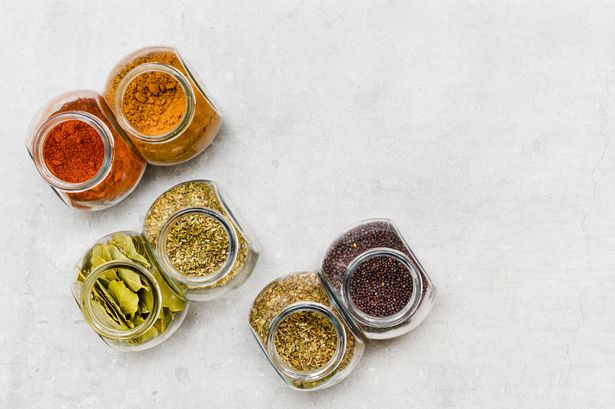Health
Pharmacist Warns: Common Spices May Interfere with Medications

A pharmaceutical expert has issued a significant warning regarding the potential interactions between certain spices and prescription medications. Dipa Kamdar, a Senior Lecturer in Pharmacy Practice at Kingston University, highlighted that commonly used spices such as cinnamon, turmeric, and ginger may affect the effectiveness of medications like warfarin and aspirin.
While these spices are celebrated for their health benefits—ranging from anti-inflammatory properties to blood sugar regulation—Kamdar emphasized that their potent nutrients can interfere with how some drugs function. She noted in her discussion on The Conversation website, “For centuries, spices haven’t just been used to flavour food but also valued in traditional Ayurvedic and Chinese medicine for their healing properties. But could something as innocent as a spoonful of spice interfere with your medication?”
Cinnamon’s Dual Nature
Cinnamon, known for its active compounds such as cinnamaldehyde, eugenol, and coumarin, offers a range of potential health benefits. Kamdar explained that it is rich in antioxidants, may reduce inflammation, and can help regulate blood sugar levels. However, a recent study from the University of Mississippi raised concerns that cinnamon could reduce the effectiveness of certain medications. Laboratory tests revealed that cinnamaldehyde activates receptors that speed up the clearance of drugs from the body, potentially diminishing their efficacy.
While this research is still in its early stages, Kamdar warned that some case reports have indicated cinnamon supplements could increase the risk of bleeding when taken alongside anticoagulants. “This is probably due to coumarin affecting liver enzymes responsible for breaking down drugs like warfarin,” she said. Although the risks are primarily associated with high doses, particularly in supplement form, she reassured that using cinnamon as a culinary spice is unlikely to cause issues.
The Impact of Turmeric and Ginger
Turmeric, particularly its active compound curcumin, is renowned for its anti-inflammatory and antioxidant properties. Kamdar noted that while information on turmeric’s interactions with medications remains limited, there is evidence suggesting that curcumin can affect the metabolism of certain drugs by interfering with liver enzymes. This could lead to increased effects when combined with antidepressants, blood pressure medications, and even chemotherapy drugs.
Moreover, turmeric possesses natural blood-thinning qualities, which can enhance the effects of medications like warfarin and aspirin. Animal studies have indicated that turmeric may lower blood sugar levels, raising concerns about its interaction with anti-diabetic drugs and insulin. As with cinnamon, Kamdar emphasized that these effects are generally linked to high-dose supplements rather than typical culinary amounts.
Ginger, recognized for its anti-nausea and anti-inflammatory benefits, also exhibits compounds that may influence medication processing. Kamdar pointed out that ginger can act as a mild blood thinner, potentially increasing the risk of bleeding when taken in conjunction with anticoagulants. The evidence regarding ginger’s effects on diabetes is mixed; while some studies suggest it may lower blood sugar, further research is necessary to understand its interactions with anti-diabetic medications fully.
For individuals taking medications—especially blood thinners, diabetes treatments, or chemotherapy drugs—Kamdar recommends consulting with a healthcare provider before beginning any new herbal supplements. She reassured the public that using spices in typical culinary amounts is safe and a flavorful way to enhance meals. “So go ahead: sprinkle, pinch, or dash—just be mindful of what’s in your medicine cabinet and be wary of taking any herbal supplement in high doses,” she advised.
As these spices continue to gain popularity for their health benefits, it is crucial for consumers to remain informed about their potential interactions with prescribed medications.
-

 Health2 months ago
Health2 months agoNeurologist Warns Excessive Use of Supplements Can Harm Brain
-

 Health2 months ago
Health2 months agoFiona Phillips’ Husband Shares Heartfelt Update on Her Alzheimer’s Journey
-

 Science2 weeks ago
Science2 weeks agoBrian Cox Addresses Claims of Alien Probe in 3I/ATLAS Discovery
-

 Science2 weeks ago
Science2 weeks agoNASA Investigates Unusual Comet 3I/ATLAS; New Findings Emerge
-

 Science2 weeks ago
Science2 weeks agoScientists Examine 3I/ATLAS: Alien Artifact or Cosmic Oddity?
-

 Entertainment4 months ago
Entertainment4 months agoKerry Katona Discusses Future Baby Plans and Brian McFadden’s Wedding
-

 Science1 week ago
Science1 week agoNASA Investigates Speedy Object 3I/ATLAS, Sparking Speculation
-

 World2 months ago
World2 months agoCole Palmer’s Cryptic Message to Kobbie Mainoo Following Loan Talks
-

 Entertainment3 months ago
Entertainment3 months agoEmmerdale Faces Tension as Dylan and April’s Lives Hang in the Balance
-

 Science1 week ago
Science1 week agoNASA Scientists Explore Origins of 3I/ATLAS, a Fast-Moving Visitor
-

 Entertainment4 months ago
Entertainment4 months agoLove Island Star Toni Laite’s Mother Expresses Disappointment Over Coupling Decision
-

 Entertainment2 months ago
Entertainment2 months agoMajor Cast Changes at Coronation Street: Exits and Returns in 2025









